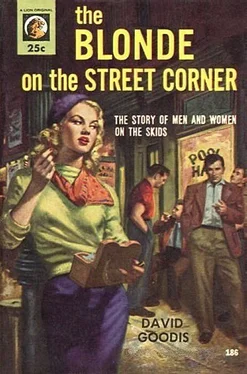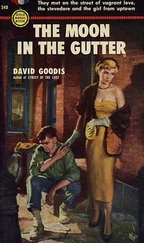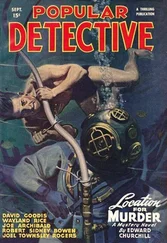Mr Creel put down the paper. “Now, Ewie, that’s not right.”
“It is right,” Ewie said. “Someone in this house has to tell the smart guy where he gets off. It’s high time he gave something in the house.”
Mr Creel said, “All right, Ewie, that’s enough.”
“Let her talk, Pop,” Ralph said. “I’m not listening to her.”
Addie came in from the kitchen and said. “What’s all the noise?”
“Look, High School, go upstairs and do your arithmetic,” Ewie said.
“You know what you can do,” Adeline shouted.
“Please, please,” Mr Creel said.
Ewie turned to Ralph and said, “You ought to be ashamed of yourself, you bum.”
“Stop picking on him, Big Mouth,” Addie said.
Ralph leaned against the side of the sofa and reached for the sports section of the paper.
Mrs Creel came in from the kitchen, wiping her hands on a towel.
Ewie said, “Mom, don’t you think this no-good loafer should go out and get himself a job?”
Mr Creel said, “Cut it out, Ewie.”
“I won’t cut it out,” Ewie declared. “I’m sick and tired of working like a slave in a department store basement.”
“Oh, now, please,” Mr Creel said.
“If he was any kind of a man he’d go out and get himself a job,” Ewie said, looking Ralph up and down and crinkling her face in disgust.
“He’s tried,” Mr Creel said. “There’s nothing around, that’s all. Leave the boy alone.”
Ralph was reading about a new lightweight from Wilkes-Barre, who was going to fight at the Cambria in a few nights.
“Well, if he can’t find a job, let him do something else,” Ewie said. “Let him join the Navy.”
“Oh, my God, no,” Mrs Creel said.
“What’s the matter with the Navy?” Ewie said.
“Nothing, but—” Mrs Creel faltered. She gulped hard, and then she moved toward Ralph, pushed her hand through his hair. He continued to read about the Wilkes-Barre lightweight. Mrs Creel gave his head a playful push and then ran her hand through his hair again and said, “I can just picture this one in the Navy. I think it would kill him. Isn’t that right, Ralph?”
Reading about the Wilkes-Barre lightweight’s snappy footwork, Ralph nodded.
“It would do him good,” Ewie said.
Ralph read about the lightweight’s eleven straight wins, with nine knockouts.
Addie went upstairs to do her lessons.
Mr Creel read about a police raid on a taproom down on Arch Street.
Ewie glanced at her fingernails, made a face as she saw that she had too much polish on one of them. The polish was chipped.
Mrs Creel gave Ralph’s head another pat and then she walked back into the kitchen.
Ewie picked up a movie magazine and went upstairs to the bathroom.
Ralph started to re-read the article concerning the Wilkes-Barre lightweight. This boy had a lot of stuff. He was very fast and although he had a habit of warning his opponent before throwing a right, it was a fault that could very easily be ironed out. The boy was a comer.
Ralph thought of the young guy, twenty-four years old, climbing into the ring with all the lights and all the yells and the announcer’s booming voice. Then moving in and dancing around and pumping a left or two and taking one and giving one and giving another and taking his time and then edging in with a left lead and another left and another left and another left and then the right and watching the other guy fall down, flat on his back, his arms spread wide, out like a light. Good feeling. Sort of a tingle running up and down in the guy. Listening to the yelling crowd, and knowing that the next fight would be bigger, the next even bigger, and going up and up and up. That sort of thing was worth all the work and the trouble and the sweat. Crowd yelling. All the lights. Articles and pictures in the paper. And the bucks coming in. A lot of bucks. The real glitter. It was the sort of thing that might happen to any guy who was willing to gamble.
It was a big gamble. The boy might get rocked with a right some night and go to sleep and it would put him right back where he had started, with the fourth-raters. But that was the gamble. It was that way with a lot of things.
With Ken and himself and their songwriting. For years and years they had been writing the songs, not making a cent, sitting there at the piano and banging away and turning out the tunes. All that time spent was a gamble. The number might come up and then again it might not. But before the dice stopped rolling there was a certain glow inside. Thinking that maybe the number might come up and then again it might not. Maybe and maybe and maybe and maybe not. But so long as there was the maybe there was the glow. It couldn’t be that way with someone who worked in a shipping room, or at a bookkeeper’s table. Guys like the Wilkes-Barre lightweight, guys like Ken, at least they reached for the glitter. Maybe they would never grab hold of it. But at least they could see it up there, dangling. That was something.
He started to whistle Ken’s tune.
He stood up, walked to the front door, put his hand on the knob while wriggling into his overcoat. Then he searched in his pockets, and didn’t find a cent. He looked at the floor.
His father was saying, “Come in here. I’ll give you some change.”
“It’s all right,” Ralph said.
“Come in here.”
He walked into the living room. His father gave him seventeen cents.
Outside, he hurried toward the corner. There was no other place to go.
George and Ken and Dippy arrived on the corner. They were arguing. Ralph listened for a few minutes and then joined in the argument. It had to do with a certain shot in billiards.
The billiard argument fizzled to a stalemate. Then Ralph talked about the Wilkes-Barre lightweight. George and Ken got in another argument, concerning the middleweight situation. Dippy told about a few phone calls he had just made. George spoke about how he had gone in town again today and found exactly nothing. He said, “You ought to see the crowds on Market Street. You oughta see them all. I bet there was a million people in town today. You might think that something special was happening. But it’s just another day. And there they were, in town, going up and down and up and down on Market Street. What are they all in town for?”
“Whaddya mean, what are they in town for?” Ken said, anxious for another argument.
“They just don’t come in town to walk up and down, do they?”
“Listen to this dumb jerk,” Ken said. “Tell me, you had a reason for going in town today, didn’t you?”
“Sure. I went in town to look for a job.”
“All right, so maybe a lot of them were there for the same reason. Or they were going into stores to buy things. Do you think people are crazy? Do you think they come in town, from all parts of the city, just to walk up and down on Market Street?”
“Do you know what I think?” George murmured, looking at the curb.
“What do you think, George?” Dippy said.
“I think a lot of those people come in town and walk up and down because they’re lonesome.”
“This is too much for me,” Ken said. He skipped over to the Indian Nut machine.
Dippy said, “If I was a pickpocket I’d work Market Street every day.”
“You wouldn’t find much,” Ken said, distributing Indian Nuts among his friends.
“You’re not kidding,” George said.
Dippy flipped an Indian Nut nine feet in the air and caught it in his mouth.
“Let’s go over to my house,” Ken said. “Nobody’s home. We’ll listen to the radio.”
The four of them started across the street.
Ralph stopped. He said, “I got a headache. I’m going home and go to bed.”
He walked off.
Читать дальше












